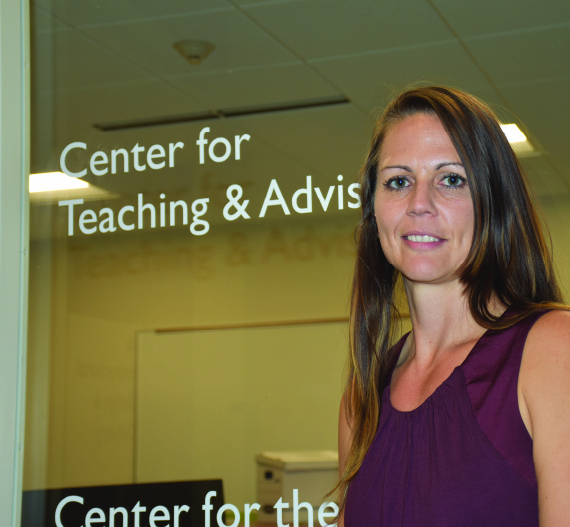Keys to a Good First Year in the Center for Teaching and Advising

Nichole Barta and other faculty members across campus are reading “What Inclusive Instructors Do” as part of the Center for Teaching and Advising’s efforts to help teachers build community within their classrooms.
Barta assumed charge of CTA at the beginning of this school year as the University’s first fulltime director.
“Most faculty want to be inclusive, but there is a lot of room in understanding what that means,” says Barta, who has taught kinesiology and sports management here since 2016. “I’ve been teaching 21 years and as I read this book, I am finding many things that I could do better; meet students where they are at in a better way.”
Barta has taken this new position running, perhaps appropriate for someone who has made exercise a part of her catalog of academic expertise. CTA has two fall priorities: 1. Assessment for success, including how to design assignments to help students achieve success, especially when considering underrepresented and first-time college students. Also, how to teach faculty assessment design to support students to develop high quality work. 2. Inclusive pedagogy. Encourage each faculty member to examine their syllabus to assess and make any necessary course design changes to make their classes inclusive for all students.
Excitement for her new job effuses from Barta, who loves helping people find solutions to their problems and soliciting ideas from others.
“We get focused in silos in our academic areas, but we need to make the time to learn best practices for teaching and effective means to advise in ways that best support our students,” Barta says, “while remaining true to our institutional priorities.
“Teaching can be overwhelming. There seems never to be enough time to do what you really want to do, so to help faculty find new ways to be more effective for students is important,” she says.
Coming out of COVID restrictions requires a balance between cura personalis and rigor. “Part of this is how to keep challenging students to learn and improve themselves when many of them are still struggling with the mental health impact. We need to be caring for our students while making sure not to burn ourselves out,” says Barta.
Barta has three faculty fellows working for CTA: Communications Studies Associate Professor Juliane Mora, inclusive pedagogy specialist; Communications Studies Senior Lecturer Kris Morehouse, advising; Art Professor Shalon Parker, new faculty.
“Each of them is an expert in their own way, reconstructing new faculty orientation, supporting pedagogy book study, and leading sessions on rank, tenure and promotion, among other assignments.
Barta Background, Going Forward
Barta grew up in Montana, her high school graduating class numbering 25. The first- generation college student taught 16 years in high school before joining Gonzaga. The last few years in secondary education she was an instructional specialist and observed a need for better teacher preparation to meet student needs. Hence, her draw to the CTA job.
She found a good fit at Gonzaga. “There is attention to the mission here. People work for the common good. I appreciate a community that wants to lift others up and collaborate on projects,” Barta says. “I appreciate my colleagues and the energy they have for student success and their willingness to collaborate. I love reflective discussions with faculty. We have students who are really engaged and want to learn here.
“I remember a student leaving my class and saying thank you. Students here are grateful for their experience. I didn’t ever have a student say thank you after a lesson in the public-school sector,” she adds.
As part of the ongoing discussions about the next Strategic Plan, Gonzaga endeavors to support and raise the level of teaching and scholastic pursuits.
“CTA is looking at expanding into a center for faculty development,” Barta says, “a central location for faculty resources and support. It will focus on four aspects: teaching, advising, scholarship and leadership. A one-stop shop where teachers can find many of the resources they need.”
An Army Reserves veteran, she wants to help teachers achieve their best academic fitness just as she has taught her students to achieve physical fitness.
“I love this message from Maya Angelou. ‘Do the best you can until you know better, then when you know better, be better.’ I like the idea of consistently trying to know better and seeing our collective growth in trying to do better."
